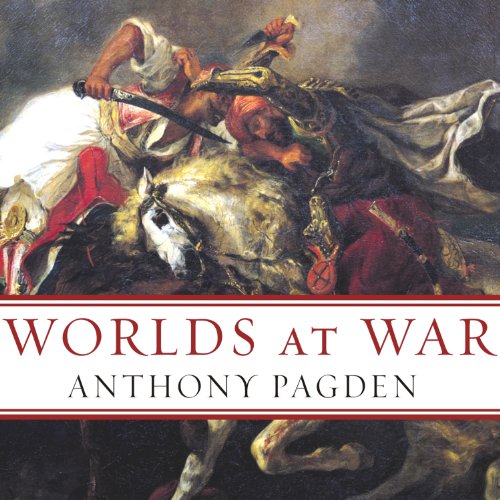
Worlds at War
The 2,500-Year Struggle Between East and West
Failed to add items
Add to basket failed.
Add to wishlist failed.
Remove from wishlist failed.
Adding to library failed
Follow podcast failed
Unfollow podcast failed
€0.00/month for the first 3 months
Buy Now for £29.99
No valid payment method on file.
We are sorry. We are not allowed to sell this product with the selected payment method
-
Narrated by:
-
John Lee
-
By:
-
Anthony Pagden
About this listen
The relationship between East and West has always been one of turmoil. In this historical tour de force, a renowned historian leads us from the world of classical antiquity, through the Dark Ages, to the Crusades, Europe's resurgence, and the dominance of the Ottoman Empire, which almost shattered Europe entirely. Pagden travels from Napoleon in Egypt to Europe's carving up of the finally moribund Ottomans - creating the modern Middle East along the way - and on to the present struggles in Iraq.
Throughout, we learn a tremendous amount about what "East" and "West" were and are, and how it has always been competing worldviews and psychologies, more than religion or power grabs, that have fed the mistrust and violence between East and West. In Pagden's dark but provocative view, this struggle cannot help but go on.
©2008 Anthony Pagden (P)2008 TantorCritic reviews
The author has researched the subject meticulously and the choice of narrator really brings the story to life.
If I had to find one criticism it is that little is told of the battle of Tours and the subsequent events.
Apart from that it is an excellent listen.
A superb history
Something went wrong. Please try again in a few minutes.
However, to my immense surprise, relief and delight, even when discussing Said Kutb's vision of the Islamic State and the rise of radical, political, Islamist Terrorism in the 20th & 21st centuries, the author remained refreshingly insightful and balanced. Pointing out that in places like Iraq & Afghanistan, we were fatally naïve to assume that people would eagerly embrace so-called 'Western, Liberal Democracy;' especially when literally their only experience of it in most cases was as Western Imperialism & Godlessness "at the wrong end of a gun." So while I've only given this audiobook 4 stars for the moment in case I've missed something vital, I will almost certainly be listening to it again and can't recommend it highly enough to everyone.
Definitely Not "The End Of History"
Something went wrong. Please try again in a few minutes.
Tedious
Something went wrong. Please try again in a few minutes.
Would you recommend this audiobook to a friend? If so, why?
Yes, this audiobook provides first class education and due to the narrator it's very enjoyable and easy to listen to.Who was your favorite character and why?
N/AWhat does John Lee bring to the story that you wouldn’t experience if you had only read the book?
John Lee narration brings the historic characters to life whilst maintaining an objective tone.If you made a film of this book, what would be the tag line be?
Impossible to make a film as the subject would fill days.Any additional comments?
This audiobook has given me (and still does) an invaluable history lesson and a greater understanding of the presence. I'd recommend this audiobook as highly valuable!Fantastic content and narration
Something went wrong. Please try again in a few minutes.



















